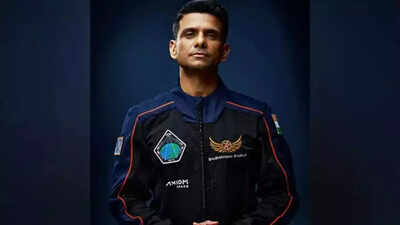Indian Astronaut to Connect with Students and ISRO Scientists from Space
Astronaut Shubhanshu Shukla, currently stationed on the International Space Station (ISS) as part of the Axiom-4 (Ax-4) mission, is scheduled to engage in an interactive session with students and scientists at the Indian Space Research Organisation (ISRO). This unique event will occur via ham radio on Friday, July 4, offering a rare glimpse into space exploration and fostering interest in STEM fields.

Shubhanshu Shukla is on a 14-day scientific expedition aboard the ISS.
The interaction is being facilitated through the ARISS (Amateur Radio on the International Space Station) program, a global initiative designed to connect students with astronauts in orbit, thereby promoting science and technology education.
The session will be conducted via a telebridge at the U R Rao Satellite Centre (URSC) in Bengaluru, with communication routed through the K6DUE ground station. According to reports, the interaction is scheduled for 3:47 PM IST (10:17 UTC) on Friday. The ARISS program aims to bridge the gap between space exploration and education, allowing students to witness science in action firsthand.
Ham Radio: A Lifeline in Space
Ham radio, also known as amateur radio, is a licensed communication system utilizing radio frequencies designated for non-commercial purposes. Popular among enthusiasts, it often serves as a crucial communication method during emergencies when conventional lines are disrupted.
In space missions, ham radio provides a reliable and direct communication channel, enabling astronauts to connect with students and amateur operators on Earth. This interaction adds a personal dimension to science education, providing students with the opportunity to converse with an astronaut in space.
Shubhanshu Shukla's Experiments on the ISS
During his time on the ISS, Shubhanshu Shukla is involved in several experiments, including:
Microalgae: Researching the potential of microalgae as a sustainable and nutrient-rich food source for astronauts. Microalgae also play a vital role in oxygen recycling and waste management. Shukla is monitoring the growth of microalgae samples through high-resolution photography to understand the effects of microgravity on their development. This research could lead to the development of closed-loop life-support systems essential for long-duration missions to the Moon, Mars, and beyond.
Neuro Motion VR project: This project employs virtual reality headsets to study cognitive performance in microgravity. Astronauts wear the headsets and perform attention-based tasks while their brain activity is monitored using functional near-infrared spectroscopy (fNIRS). The data gathered will help scientists understand how space travel impacts mental acuity, motor skills, and memory, which is critical for astronauts performing complex tasks in stressful, confined environments during deep space missions.
The Telemetric Health AI: This research focuses on integrating biometric data with AI-based mission analytics to assess the impact of space on cardiovascular health and balance systems. Utilizing real-time data analysis and predictive models, this project aims to revolutionize in-flight medical monitoring and potentially lead to the development of remote diagnostic tools for use in rural or emergency settings on Earth. This highlights the potential for medical innovation through space research.
Newer articles
 Gavaskar Calls for Yadav's Inclusion, Questions Middle Order After India's Test Defeat
Gavaskar Calls for Yadav's Inclusion, Questions Middle Order After India's Test Defeat
 7 Proven Strategies for Interview Success: Project Confidence and Authenticity
7 Proven Strategies for Interview Success: Project Confidence and Authenticity
 Daren Sammy Fined, Handed Demerit Point for Umpire Criticism After Test Match Comments
Daren Sammy Fined, Handed Demerit Point for Umpire Criticism After Test Match Comments
 Hair Oil vs. Hair Serum: Which is the Right Choice for Your Hair? A Guide to Benefits and Uses
Hair Oil vs. Hair Serum: Which is the Right Choice for Your Hair? A Guide to Benefits and Uses
 India's Fielding Blunders Under Fire After First Test Defeat Against England
India's Fielding Blunders Under Fire After First Test Defeat Against England
 Unlock Longevity: 3 Timeless Lessons From Japan's Village of Ogimi
Unlock Longevity: 3 Timeless Lessons From Japan's Village of Ogimi
 Mirabai Chanu Reveals Relentless Training Demands, Weight Discipline Dictates Life Beyond the Gym
Mirabai Chanu Reveals Relentless Training Demands, Weight Discipline Dictates Life Beyond the Gym
 Prithvi Shaw Admits to Career Stumbles, Cites Poor Choices and Distractions
Prithvi Shaw Admits to Career Stumbles, Cites Poor Choices and Distractions
 Facial Icing: Benefits, Risks, and Safe Application of This Viral Beauty Trend
Facial Icing: Benefits, Risks, and Safe Application of This Viral Beauty Trend
 Pant Soars to Career-Best, Bumrah Retains Top Spot in Latest ICC Test Rankings; Root Still King
Pant Soars to Career-Best, Bumrah Retains Top Spot in Latest ICC Test Rankings; Root Still King